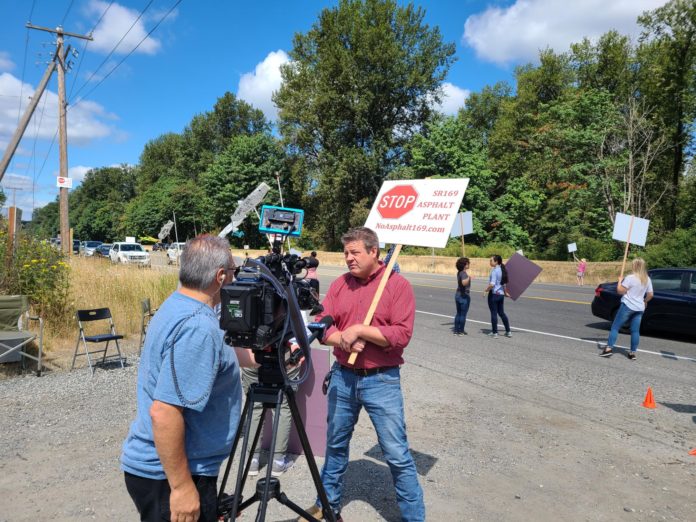In response to the King County Permitting Division’s controversial decision Thursday to approve the construction of an asphalt plant along state Route 169 in an area along the shore of the Cedar River in rural King County, King County Councilmember Reagan Dunn issued the following statement condemning the decision:
“After fighting against the impending asphalt plant for years, I am extremely disappointed and, frankly, greatly troubled by the Permitting Division’s decision today to allow it to move forward. Siting an asphalt plant so close to the Cedar River — an environmentally sensitive location that is home to critical salmon habitat in addition to being a drinking water source for 1.4 million people in our region — presents an unwarranted risk of contamination and overly burdens rural communities with pollution, traffic, and other known impacts. This is shockingly poor land use policy that, I fear, will have harmful ramifications for generations to come.”
The parcel that would host the asphalt plant is adjacent to the Cedar River — the drinking water source for 1.4 million people in the region, and critical habitat for chinook, coho, sockeye, and kokanee salmon, as well as trout and other fish. Other known impacts of asphalt plants are numerous — including toxic air pollutants, silica dust exposure, high levels of noise, noxious odors, increased traffic, and declining property values. For these reasons, the proposed plant has attracted strong opposition from the local community.
Dunn also issued a formal letter (BELOW) to the Permitting Division, urging a reconsideration of the approval and imploring the maximum protections to be imposed:
“In strongest possible terms, I urge the Permitting Division in the executive branch of County government to reconsider allowing an asphalt plant to be built at this environmentally sensitive rural location. As the decision currently stands, I am concerned that you will not hold Lakeside Industries to the highest possible standard and fail to impose the maximum mitigation measures required for this type of use. These include, but are not limited to, paying for the impact of their facility on infrastructure, for air quality monitoring, dust barriers, and other environmental mitigations. These items would be the least King County can do to preserve our environment, protect struggling salmon population, and protect the people of the greater Renton and Maple Valley areas in Southeast King County.”
Dunn has a long history of outspoken opposition to the asphalt plant siting, including sponsoring a 2017 moratorium on the proposed asphalt plant, holding numerous community town halls, writing letters opposing the permit, and standing on SR 169 with other members of the community picketing the location of the proposed site.
April 14, 2022
Reagan Dunn
Councilmember, District 9
Metropolitan King County Council
Jim Chan
Division Director for Department of Local Services Permitting Division 35030 SE Douglas St., Ste. 210
Snoqualmie, WA 98065
Dear Director Chan:
I am writing in response to the troubling decision issued today by the Permitting Division of the Department of Local Services to approve the permit application put forward by Lakeside Industries for building permit COMM18-0014 and shoreline permit SHOR18-0032 (“asphalt plant”).
I have long maintained that allowing an asphalt plan in a rural area, along SR 169 and just feet away from the Cedar River, is shockingly poor land use policy—and one that not only goes against King County’s central value of environmental preservation, but our state and county’s growth management policy that aims to preserve rural character.
The environmental risks associated with siting an asphalt plant so close to the Cedar River, a vital environmental resource, are extremely concerning. The Cedar River is crucial habitat for vulnerable Chinook, Coho, Sockeye, and Kokanee salmon, which King County dedicates great resources to preserving through initiatives such as habitat restoration and fish passage improvements—making the siting of an asphalt plant along similar habitat diametrically opposed to other investments made by King County government. Perhaps equally as concerning is that the risk of contamination threatens the safety of the Cedar River as a primary source of drinking water for 1.4 million people in our region.
I am also greatly sympathetic to the surrounding rural community that will bear the burden of other known impacts of the asphalt plant, such as toxic air pollutants, silica dust exposure, high levels of noise, noxious odors, increased traffic, and declining property values. This is a community that for decades has already suffered through the environmental and economic impacts of residing so close to King County’s Cedar Hills Regional Landfill. Over 10,000 residents of Renton, Maple Valley, Fairwood, the East Renton Highlands, and Hobart have signed a petition created by Citizens to Stop the SR 169 Asphalt Plant opposing the plant due to the pollution, traffic, and other harmful effects it could bring.
In strongest possible terms, I urge the Permitting Division in the executive branch of County government to reconsider allowing an asphalt plant to be built at this environmentally sensitive rural location. As the decision currently stands, I am concerned that you will not hold Lakeside Industries to the highest possible standard and fail to impose the maximum mitigation measures required for this type of use. These include, but are not limited to, paying for the impact of their facility on infrastructure, for air
King County Courthouse, 516 Third Avenue Suite 1200, Seattle, WA 98104 206-477-1009 reagan.dunn@kingcounty.gov www.kingcounty.gov/dunn
quality monitoring, dust barriers, and other environmental mitigations. These items would be the least King County should mandate to preserve our environment, protect struggling salmon population, and protect the people of the greater Renton and Maple Valley areas in Southeast King County. Thank you for reconsidering this decision.
Sincerely,
Reagan Dunn
King County Councilmember District 9
Cc: John Taylor, Director, Department of Local Services








